Google AdWords Advertiser Statistics, via SEM Rush
Google gained popularity with advertisers in part through the accessibility and affordability of their AdWords ad program, which made it possible for almost anyone to advertise online. When the ad platform was young and inefficient (due to limited competition) you did not need to be skilled to profit. You only needed a credit card and a decent website.
But over the years Google has made their system much more complex, and increased competition + better competitive intelligence tools + all the layers of ignorance tax baked into AdWords (default match type as broad, expanded broad match, automatic matching, search syndication & content network on by default, tons of click fraud on the content network, etc.) have made profitably running an AdWords campaign much more challenging.
Google has hundreds of thousands of advertisers, but over 80% of their United States ad revenue comes from the top 1.35% of advertisers, according to a recent study of keyword data by SEM Rush.
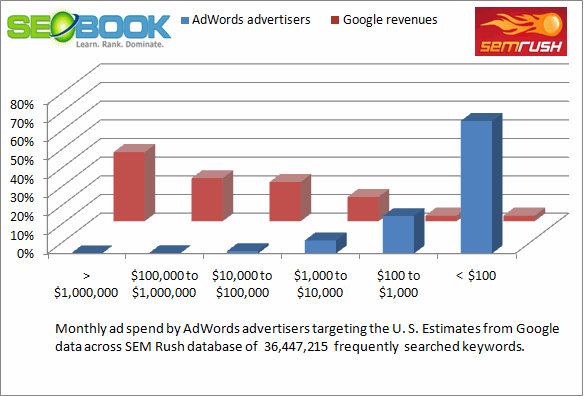
The above number might be skewed toward larger advertisers due to the limited size of the SEM Rush keyword database, but the additions of expanded broad match, automatic matching, and quality scores means that the top advertisers are more likely to show up on longtail keyword search queries as well. And the limited database which over-represents some larger advertisers also misses inactive accounts and micro-advertisers which would likely mean that 80% of Google's ad revenues are coming from closer to only 1% of their advertisers (rather than the 1.35% in this data sample).
Why do brands sort out the cesspool, as Eric Schmidt fondly states?
- brands provide most of the ad dollars
- creating a brand typically requires buying a lot of awareness via advertising
- branded keywords can be expensive
- ad waste, fraud, and sloppy account management by brands can be justified as a brand spend, and is under less scrutiny than ad spend of direct marketers
More Google AdWords advertiser data from SEM Rush after the jump
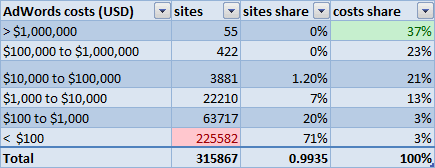
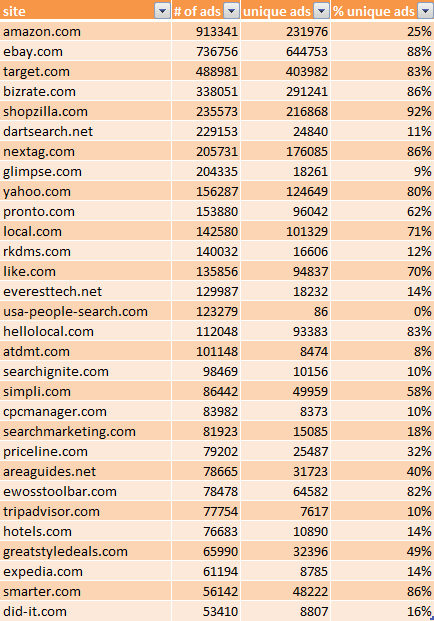
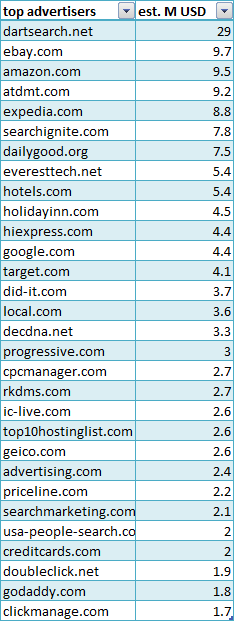
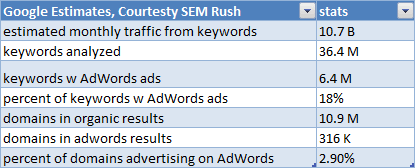




Comments
Nice graph, Aaron.
That 80% / 1.35% ratio really shows a hyper-squeezed Pareto principle. This shines a brighter light on the rational behind Eric's "brands sort out the cesspool," and it wouldn't be about what's best for the user.
Didn't realize Did-It, Search Ignite and SearchMarketing.com (who? nice domain anyways...) managed such big accounts.
I find it interesting that only 18% of keywords have associated Adword ads. This is some insightful information on Adwords advertisers.
I thought the top advertisers list was full of Fortune 500 companies but it is not. I guess it is a good thing.
Interesting insights, Aaron.
The only thing that I would say is that based on the large programs that we run at my agency, it's more or less a given that branded terms are less expensive than generic terms for the most part. However, that could change now that Google has re-written the rules on brand bidding.
From a merchant standpoint I know that brand keywords convert the best. I see it in my stats here, I understand that it makes sense via understanding branding and word of mouth marketing, and I have seen it time and again for client websites.
Currently I have a merchant that I buy AdWords for and he only sells for 1 manufacturer. The ***only*** keywords we can profitably buy for his site is the brand he sells (and derivative keywords that include the brand).
Those brand keywords typically cost 3x to 10x what similar generic keywords go for, but they are worth more than that to the business. Other clicks can be 25 cents and not convert, where the brand can cost a couple dollars and be profitable.
If you ever look at a list of the most expensive keywords on the web (multiplying ad price * search volume) in the retail field, you will see that a large percentage of high value and high volume keywords tend to be brands.
I hear ya, Aaron. I just wanted to let you know that based on a few dozen large brands that we manage paid search for, branded terms are almost always less expensive than broad generic terms.
I wouldn't say it if it weren't based on concrete data (albeit only a cross segment).
Were those largely people buying their own brand Hugo, or customers buying 3rd party brand keywords?
I guess the way I think of it is that brand is sorta pent up demand, and for those selling 3rd party brands, those keywords are some of the more potent words out there from a demand & conversion standpoint.
I think it would be much more appropriate to label dartsearch, atdmt, and several of the others as ad platforms or agencies rather than as advertisers. The reason you don't see more Fortune 500's on this list is because they're the main users of these ad platforms.
For example, if you look at the ads for search phrases like "Ford Mustang", "Chevy Corvette", "Dodge Charger", "Hummer", "Toyota Prius", and use the "Copy Link Location" function to peek at the destination URL, then you will see that all of those are using dartsearch.net; no wonder it is listed at $29MM/month in spending. But for those ads I would consider the advertisers to be the car companies, not DoubleClick (owners of the DART ad platform).
What SEM Rush needs to do to get useful data is to follow the redirects to get to the actual landing page rather than just looking at the destination URL that often points to an ad platform URL for tracking purposes.
I totally agree Rehan.
The other potential data point worth looking into would be grouping website ownership. Networks like IAC, Expedia, and AOL all run many websites that are advertised on Google AdWords.
That tool (SEMRush) is off by a factor of 10 for our traffic stats on two sites and off by a factor of 4 for our adwords spend. We spend over $100K monthly and it only reports $26K.
Google will fall the second that some one will find a better ad system, thats because its their only revenue stream,
all other adventures (Docs, Wiki etc.) does not bring them any.
This will never happen due to the fact that these advertisers rarely optimize their campaigns for the full ROI. BUT they raise CPC prices - people always forget that AdWords are bidding engine. Higher the bid - more money for Google.
Add new comment